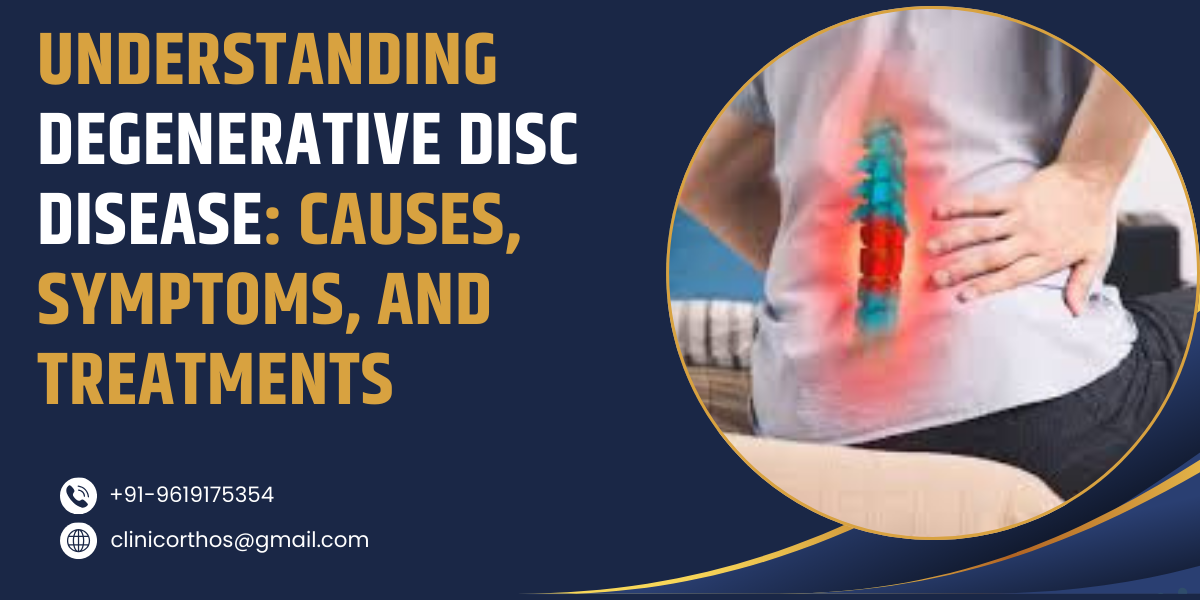Understanding Degenerative Disc Disease: Causes, Symptoms, and Treatment.
What is Degenerative Disc Disease?
Degenerative Disc Disease is a condition where the discs between the bones of your spine start to wear down over time. These discs act like cushions, and when they deteriorate, it can cause pain, stiffness, and sometimes even problems with movement. Despite the name, it’s not really a disease but a natural part of aging for some people.
According to Dr. Shrikant Dalal, a leading spine specialist in Pune, Degenerative Disc Disease) is a condition that affects the intervertebral discs in your spine. These discs act as cushions between the vertebrae of your spine, but over time, due to wear and tear or aging, they can lose their flexibility and elasticity, leading to pain and discomfort. He emphasizes that Degenerative Disc Disease is not a disease but rather a degenerative condition that can significantly impact your quality of life.
What are the Main Causes of Degenerative Disc Disease?
As a renowned spine specialist in Pune, Dr. Shrikant Dalal explains that several factors contribute to the development of Degenerative Disc Disease, including:
Aging: The natural aging process leads to the degeneration of spinal discs, making them less flexible.
Genetics: Some individuals may be genetically predisposed to developing DDD at an earlier age or with greater severity.
Injury: Trauma or injury to the spine can accelerate the degeneration of discs.
Repetitive Stress: Activities that place repeated strain on the spine, such as heavy lifting or certain sports, can contribute to disc degeneration.
What are the Main Symptoms of Degenerative Disc Disease?
Dr. Shrikant Dalal, a trusted spine surgeon in Pune, notes that the symptoms of Degenerative Disc Diseasecan vary depending on the location and severity of the condition. Common symptoms include:
Chronic Pain: Persistent pain in the lower back, neck, or other areas of the spine.
Radiating Pain: Pain that radiates down the arms or legs, often referred to as sciatica when it affects the lower back.
Stiffness: Reduced flexibility and range of motion in the spine.
Weakness or Numbness: In severe cases, nerve compression can lead to weakness, numbness, or tingling in the limbs.
What is the Best Treatment for Degenerative Disc Disease?
Treatment for Degenerative Disc Disease often involves a combination of non-surgical approaches. Dr. Shrikant Dalal, a leading spine specialist in Pune, recommends the following options:
Physical Therapy: Exercises to strengthen the muscles supporting the spine and improve flexibility.
Medications: Over-the-counter pain relievers, anti-inflammatory drugs, and muscle relaxants can help manage pain.
Lifestyle Modifications: Weight management, quitting smoking, and avoiding activities that strain the spine can help alleviate symptoms.
Injections: Corticosteroid injections may provide temporary relief by reducing inflammation around the affected disc.
How to Sleep with a Degenerative Disc?
Dr. Shrikant Dalal, a respected spine surgeon in Pune, advises that sleeping with Degenerative Disc Disease can be challenging, but certain positions can help reduce discomfort:
Use a Supportive Mattress: A medium-firm mattress that supports your spine’s natural curvature can help alleviate pressure on the discs.
Side Sleeping: Sleeping on your side with a pillow between your knees can help keep your spine aligned.
Back Sleeping: If you prefer sleeping on your back, place a pillow under your knees to maintain the natural curve of your spine.
What is the Best Medication for Degenerative Disc Disease?
Medications for Degenerative Disc Disease focus on pain relief and reducing inflammation. Dr. Shrikant Dalal, a leading spine specialist in Pune, suggests the following options:
NSAIDs: Nonsteroidal anti-inflammatory drugs like ibuprofen or naproxen can help reduce pain and inflammation.
Acetaminophen: A pain reliever that can be used if NSAIDs are not suitable.
Muscle Relaxants: These may be prescribed if muscle spasms accompany your symptoms.
Prescription Pain Relievers: In severe cases, stronger medications like opioids may be prescribed for short-term use.
What Age Does Degenerative Disc Disease Start?
Dr. Shrikant Dalal, an expert spine surgeon in Pune, explains that Degenerative Disc Disease can begin as early as your 30s or 40s, although symptoms may not become noticeable until later. The aging process naturally leads to some level of disc degeneration, but not everyone will experience pain or other symptoms.
Is Degenerative Disc Disease Serious?
While Degenerative Disc Disease is not life-threatening, Dr. Shrikant Dalal, a seasoned spine specialist in Pune, warns that it can significantly impact your quality of life. Chronic pain and reduced mobility can lead to physical and emotional challenges. In some cases, severe disc degeneration can lead to complications such as spinal stenosis or herniated discs, which may require more intensive treatment.
How Can I Prevent Degenerative Disc Disease from Getting Worse?
To prevent Degenerative Disc Disease from worsening, Dr. Shrikant Dalal, a well-known spine surgeon in Pune, recommends the following strategies:
Maintain a Healthy Weight: Excess weight places additional strain on your spine.
Stay Active: Regular exercise, particularly core strengthening, can help support your spine.
Avoid Smoking: Smoking can reduce blood flow to the discs, accelerating degeneration.
Practice Good Posture: Proper posture while sitting, standing, and lifting can reduce stress on your spine.
When Does Degenerative Disc Disease Need Surgery?
Surgery is typically considered a last resort for Degenerative Disc Disease and is only recommended when conservative treatments fail to relieve symptoms or if there is significant nerve compression leading to severe pain, weakness, or loss of function. Dr. Shrikant Dalal, an expert spine specialist in Pune, may recommend surgical options such as:
Discectomy: Removing part of the damaged disc to relieve pressure on the nerves.
Spinal Fusion: Fusing two or more vertebrae to stabilize the spine.
Artificial Disc Replacement: Replacing the damaged disc with an artificial one to maintain motion in the spine.
Understanding Degenerative Disc Disease and its treatment options, with insights from Dr. Shrikant Dalal, can help you manage symptoms effectively and maintain a good quality of life. If you’re experiencing persistent back pain or other symptoms, consult with Dr. Shrikant Dalal, a trusted spine surgeon in Pune, to develop a personalized treatment plan.


